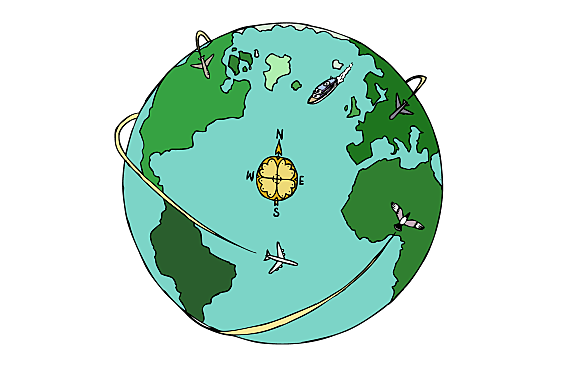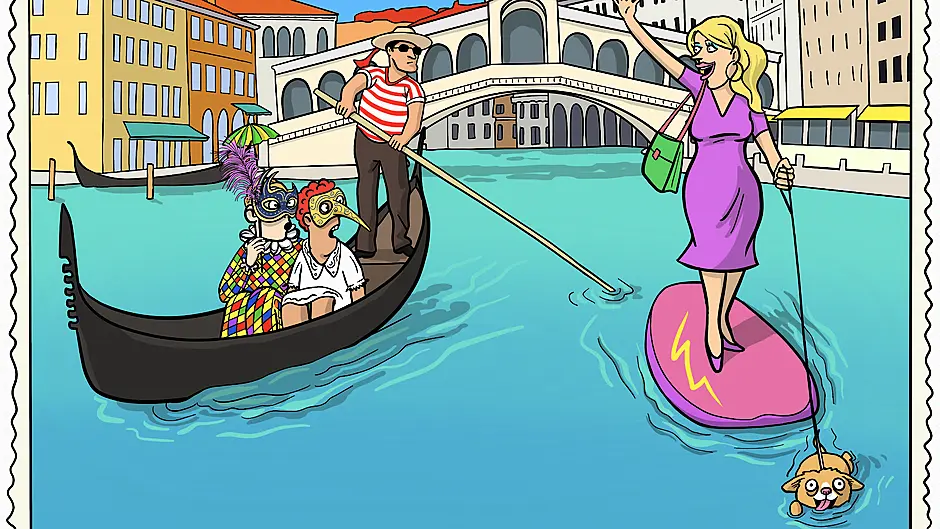Without further ado, here are ten reasons to learn Italian, in English, from a company that also teaches French, Spanish and German.
People are often charmed by the musicality of Italian, as well as the promise of la dolce vita. The language ranks fourth among the world’s most learned languages, after English, French and Spanish.
Most importantly, Italian is associated with a rich culture whose influence extends to all four corners of the globe.
If you are trying to broaden your career opportunities, travel with confidence, or simply master your menu, you can’t go wrong with the language of DaVinci and Mona Lisa.
Here is a (non-exhaustive) list of 10 solid reasons to Italian. Andiamo!
Italian is the language of art
Speaking a foreign language is not just about memorizing grammar modules and conjugating verbs. It is equally important to understand the country’s culture and approach the language from a broader, more cultural perspective.
Italy has produced some of the world’s greatest artists: the works of Leonardo da Vinci, Botticelli and Raphael remain an eternal source of inspiration for artists today.
If you are a lover of literary classics, learning Italian will enable you to immerse yourself in the world of Dante and appreciate the subtleties of The Divine Comedy. You may prefer more modern works by authors like Primo Levi or Elena Ferrante.
Italian cinema is famous all over the world. Its masterpieces have become part of our collective memory. Fellini’s La Dolce Vita, with its famous scene at the Trevi Fountain, is one of Italy’s many cinematic gems.
Bear in mind that learning Italian will allow you to (re)discover the abundance of cultural wonders that Italy has to offer. You can be sure that they’re even better in the original version!
It’s an outstanding country to visit
Italy is Europe’s third most popular tourist destination after France and Spain, and one of the most visited countries in the world. Millions of tourists flock to the country every year, drawn by the rich history and beautiful landscapes.
60% of the world’s most important works of art are located in Italy. The country also boasts the most UNESCO World Heritage sites (a total of 58). From Pompeii to the Eolian Islands to the Dolomites, Italy is full of historical treasures that are well worth visiting.
The list of cultural events, sites and museums is endless: festivals like the Venice Biennale bring together art lovers through music, painting and architecture. Rome offers a stunning array of museums, as do the cities of Turin and Palermo.
If you are a music lover, you might enjoy visiting Cremona, which has a tradition of making stringed instruments that goes back to the 16th century. It is the home of Stradivarius, the maker of the world’s most famous violins.
Its gastronomy is second to none
Pasta, pizza, tiramisu, mozzarella… even the words are mouth-watering! Italian specialties are famous all over the world and are a vital part of the country’s identity.
If you really want to experience the cuisine and discover some of the less well-known specialties, understanding the language is a huge plus, otherwise, navigating between your osso-buco, farinata, and involtini may get confusing. Learning the language will also help you decipher Italian menus and enjoy your favorite dishes.
By learning more about Italian cuisine, you may also avoid the cardinal sin of adding cream to your pasta carbonara.
Italian is spoken in more than 30 countries

There are over 63 million native speakers of Italian worldwide. Six countries have Italian as an official language: Italy, the Vatican, San Marino, Slovenia, Croatia and some Swiss cantons. Apart from Italy, these countries speak other official languages as well as Italian: in Switzerland, for example, people speak Italian, French, German and Romansh.
Italian is a heritage language. In the 20th century, more than 26 million Italians left the peninsula for the United States, Argentina, Africa and Brazil. While older generations may have lost touch with their mother tongue, more and more young people from this diaspora are learning Italian to reconnect with their roots.
Did you know? 4 million French people have Italian origins. This mainly dates back to the First World War, when France was suffering from a labor shortage in the agricultural and industrial sectors.
Italian is easy to learn for Romance language speakers
Italian, French, Spanish and Portuguese are all Romance languages sharing the same Latin roots. If you speak a Romance language, then bear in mind that learning Italian will make learning subsequent Romance languages much easier.
Italian has many advantages in terms of language learning: there are very few tonal accents, and the language is written as it is pronounced. While the grammar and conjugation can be challenging, they are similar to other Romance languages. Spanish, French and Portuguese speakers will find countless similarities with their own language. As a result, many words can be easily understood.
For example:
“A book” translates to un libro.
“To understand” translates to comprendere.
“Restaurant” is ristorante.
If you remember that words ending in “o” in Italian are usually masculine and those ending in “a” are usually feminine, you’ll be well on your way!
To open up to new career opportunities
Wearing an Armani suit, Dolce & Gabbana sunglasses and Gucci shoes while you drive your Ferrari? Surely you’re not, but these stylish brands come from Italy and contribute to the country’s recognition throughout the world.
Italy is well known for its automotive, fashion and tourism industries. The country also has the world’s seventh-largest aerospace industry, with a gross annual revenue of around 14 billion euros.
Speaking Italian is useful if you plan to pursue a career in any of these sectors. Also, since Spanish and German are often specified in job offers, speaking Italian may make a real difference in a recruitment process.

To travel and meet new people
Being able to communicate when you travel is a great way to build relationships with local people. What could be more satisfying than booking a hotel in Italian or chatting to the tour guide on your next trip to Naples?
If you feel like flying to Rome for a weekend or attending Milan Fashion Week, speaking some Italian will help you blend in, or at least stick out less.
Familiarity with the language enables you to chat with native speakers in a souvenir shop or restaurant. And who knows, they might reveal their most intimate secrets or recommend a place to visit!
Learn more about Italian fashion
Italy’s fashion is iconic and reflects a long-standing love affair with luxury and elegance.
Rome and Milan are major fashion capitals, especially for Haute Couture. Gucci, Dolce & Gabbana, Armani, Versace, Nina Ricci… The list goes on when it comes to prestigious names with global reputations.
Italian fashion is exported all over the world thanks to strong artisanal traditions in Italian cities, such as Florence for leather goods and Genoa for shirts.
If you visit any of these cities, you will have an opportunity to go shopping in streets steeped in history. Establishments often date back several centuries, and many have retained their original charm.
Learn to speak with your hands
While this may be a cliché, it’s not far away from the truth – when an Italian person expresses themselves, they use their entire body. Vigorous gesticulation is an intrinsic part of the language’s charm. But did you know that there is a historical explanation for this highly developed body language? According to Isabella Poggi, a professor of communication psychology in Rome, Italians began using their hands to communicate with each other during the Byzantine, Greek and Spanish invasions.
So don’t hesitate to practice using your hands to punctuate your sentences in Italian: it’s another way of immersing yourself in the subtleties of the language!
Click here to try our online Italian course, free for 30 days with The Southern Star!









